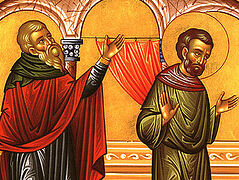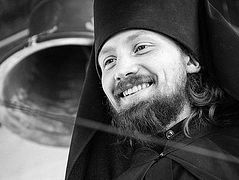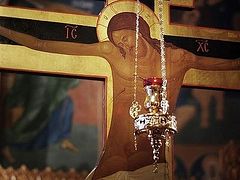 Photo: Ilya Shpagin / Pravoslavie.ru Those who belong to the Church only out of habit or out of observance of tradition, ordinarily see Great Lent, those six weeks which lead us to Passion Week and Pascha, as merely a time of certain self-restriction. Such an attitude towards Great Lent may be characterized as a negative: One must deny oneself meat and dairy products, dancing, and other entertainment, and at some point, during Great Lent, one must go to Confession and Communion. In those who belong to the Church not out of pious inertia, but who strive for a conscious and comprehending faith, we find a different attitude toward Great Lent. Such people cannot fail to notice that in Church during Great Lent, it is the style of liturgical expression that changes first and foremost. It would be wrong to see in it merely a call for our repentance and correction, although this unquestionably enters into the liturgical subject matter of the Great Lenten period.
Photo: Ilya Shpagin / Pravoslavie.ru Those who belong to the Church only out of habit or out of observance of tradition, ordinarily see Great Lent, those six weeks which lead us to Passion Week and Pascha, as merely a time of certain self-restriction. Such an attitude towards Great Lent may be characterized as a negative: One must deny oneself meat and dairy products, dancing, and other entertainment, and at some point, during Great Lent, one must go to Confession and Communion. In those who belong to the Church not out of pious inertia, but who strive for a conscious and comprehending faith, we find a different attitude toward Great Lent. Such people cannot fail to notice that in Church during Great Lent, it is the style of liturgical expression that changes first and foremost. It would be wrong to see in it merely a call for our repentance and correction, although this unquestionably enters into the liturgical subject matter of the Great Lenten period.
However, the mission of the Church in the world does not rest in denouncing people and calling them to change. Any of the multitude of systems of moral philosophy could deal with that problem. The Church, rather, shows us, again and again, the basic truth of New Testament revelation‚—i.e., that to be a Christian means to experience the Mystery of birth into a new life, and already here, on earth, to recognize oneself as being a citizen of the Kingdom of God revealed to us by Christ. Accordingly, for Orthodox Christians Great Lent is a time of bright sorrow, and at the same time a difficult, measured, spiritual struggle, a pilgrimage to a wonderful goal: the Feast of the Resurrection of Christ, Holy Pascha.
Why do we call the time of Great Lent a time of bright sorrow? We experience sorrow because we recognize that, we, like the prodigal son of the Gospel, left our Father’s house and went to a far country, that in our distracted life of vanity, we did not preserve that purity of the baptismal garment in which we were dressed when we entered the Church. We need to cast off our shackled state, that ordinary routine which instills in us the idea that the life of the fallen world, both in ourselves and around us, is the only possible way of life. To yearn for the other pattern of life, shown to us in the Gospels and in the experience of the saints and spiritual strugglers, means to commune of that bright sorrow which is the beginning of spiritual renewal. The sorrow is bright because we know that upon our return to Him, God receives us with that same love and readiness to forgive us, as the father in the Gospel parable received his prodigal son. For this reason, the central theme of the entire period of Great Lent becomes that mystical conjoining of sorrow and hope, of darkness and light: God made me His temple, but that temple needs cleansing and renewal, and I believe and hope that God will help me perform it.
In the service with which Great Lent begins, the Vespers on Forgiveness Sunday, we hear the words of the “Great Prokeimenon,” expressing both mourning and hope: “Turn not Thy countenance away from Thy servant, for I am afflicted! Quickly hearken unto me. Attend unto my soul and deliver it.”
Great Lent lasts for forty days. We know that the chosen people traveled for forty years between their bondage in Egypt and the promised land. For forty days Christ fasted in the desert before entering upon his service of the Word and Sacrifice. Himself without sin, He gave us an example of renewal through fasting. And for us, this is a forty-day journey to the light of Holy Pascha—for the feast of the Resurrection of Christ is not merely a great feast, or even the greatest of all the feasts of the liturgical year, but is the very essence and heart of our faith. Without immutable faith in the fact that in Christ, not only sin, but also the seemingly all-mighty power of death, was defeated, the message of the Gospel loses its meaning: Why renew and revive something which is damned to die, disintegrate and be forgotten anyway? This is exactly why the Apostle Paul said that if Christ is not resurrected, then our faith is in vain. However, every word of the Christian Good News, revealed to us through the spiritual struggle of faith, through the miracle of the Resurrection, lives and breathes, and the light of approaching Pascha illuminates the days of Great Lent.



